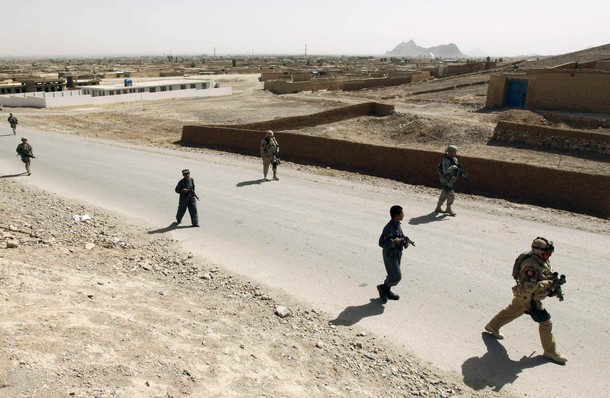
The United States and its ISAF allies are inching closer to the next big battleground in Afghanistan–the assault on Kandahar City. Kandahar, of course, is both the hometown of Afghan President and sometimes U.S. buddy Hamid Karzai and the main urban redoubt of the Taliban. This juxtaposition in itself creates the parameters for the mission and the controversy surrounding it. Put simply (some might say too simply), the U.S./ISAF wants to drive the Taliban out as part of pacifying the country and “winning the war”; Karzai is more concerned that the dislodging of the Taliban will alienate residents of Kandahar even more than they already are.
The result is a scenario worthy of Larry, Curley, and Mo. The Taliban are smart enough not to emulate General Hood in the fall of 1864, when he marched his defending Confederate army out of Atlanta where they could conveniently be slaughtered by Union forces. Instead, they are likely (gasp!) to remain in the city, imbedded with the population and offering sporadic resistance until the Americans weary of the whole operation and leave. The Americans will be faced with impossible tactical situations where they cannot secure parts of the city without leveling them (thereby driving more citizens into the arms of the opposition), and where anything they do that harms anybody or anything will likely be opposed by Karzai and his merry band of thieves. Anybody like to volunteer to organize or lead the “Cooperation in Kandahar” campaign?
The Kandahar campaign is now being trumpeted as fundamental to the entire American effort in Afghanistan: if we succeed here, the chances of success nationally are much improved. If we fail, well…. The problem is that this mission is almost certainly destined to fail. Does anybody hear much of anything about the last great thrust in Helmand province? Is Marja now a shining example of liberated freedom and prosperity? Does anybody seriously believe that a year from now, we will look back at Kandahar and say, “nice job?” Anyone who answers any of these questions positively should have his or her drinking water analyzed immediately.
Why are we doing this? Is it because we simply have no idea what else to do? Do leaders from Stan McChrystal on down understand this whole thing is a fool’s errand that cannot succeed under the best of circumstances?
Let me suggest a diabolical interpretation worthy of a political pot boiler. Assume that the leadership in the Obama White House does understand that we cannot win in Afghanistan but feels it cannot simply fold the tent and leave in the current political climate. That perception is certainly not a stretch. Assume further that they understand that cutting our losses and withdrawing is in the American best interest. Also not a very difficult assumption to make. Assume further that it needs to devise a way out that conforms to its stated goal of beginning the withdrawal next summer. Also not hard to imagine.
The question is how, and the feckless assault on Kandahar is the answer. It won’t work, and they know it. What it might do, however, is to create the public perception that we have tried our hardest, they do not appreciate our efforts, and so we are leaving them to their own devices. A pox on their houses! Karzai is almost certain to cooperate, whimpering for the home folks whenever a brick gets blown up during the operation. If it temporarily succeeds in a few places, the situation will almost certainly unravel quickly as the Americans turn over those parts of the city they liberate to the Afghans, who either bumble or steal away whatever temporary gains that were made. We can then throw our hands in the air and say, “We tried. Lord knows we tried,” and then pack our bags and leave.
Would such a solution please everyone? Of course not–particularly in the current poisonous political atmosphere. But if it served to begin the withdrawal and even to be reflected in reduced spending that was coinciding with an improving economy, would it make political sense as the 2012 political season began to take shape?
The United States had a similar opportunity in 1963 after the assassination of Ngo Dinh Diem in Vietnam. At that point, some analysts who were spurned at the time but look much more prescient in retrospect, argued that this was the golden opportunity to cut the umbilical cord with Vietnam, basically on the same ”mission impossible” grounds that exist in Afghanistan today. The United States blew the opportunity then. Are there cooler heads in the White House now who are ready to seize, rather than abandon, an opportunity? Stay tuned.
Donald M. Snow, Professor Emeritus at the University of Alabama, is the author of over 40 books on foreign policy, international relations and national security topics. This essay was originally published at his blog What After Iraq? Photo credit: Reuters Pictures.
Image: 610x_9.jpg
